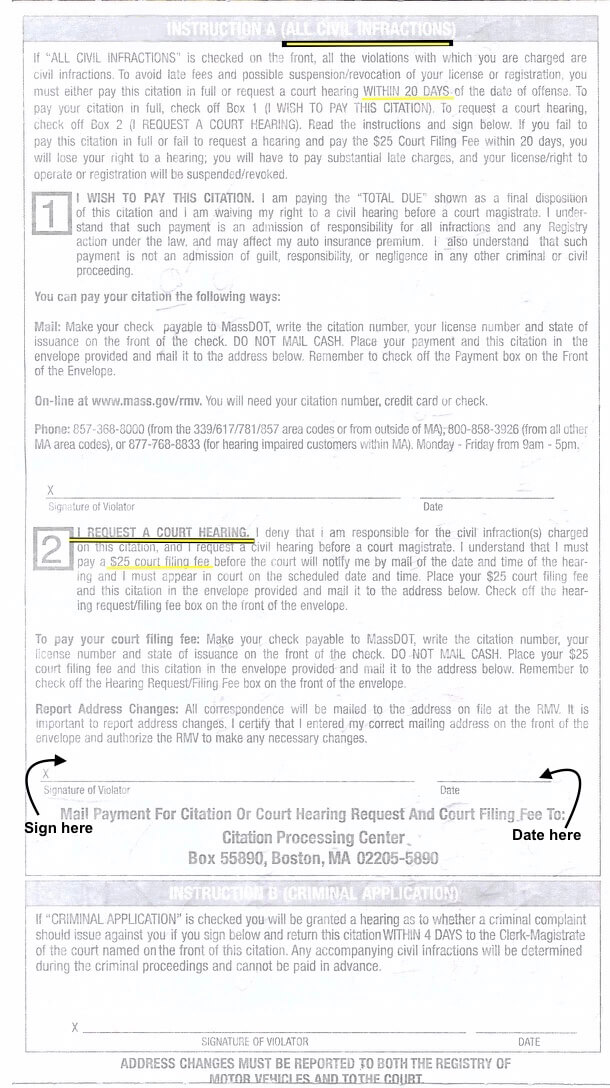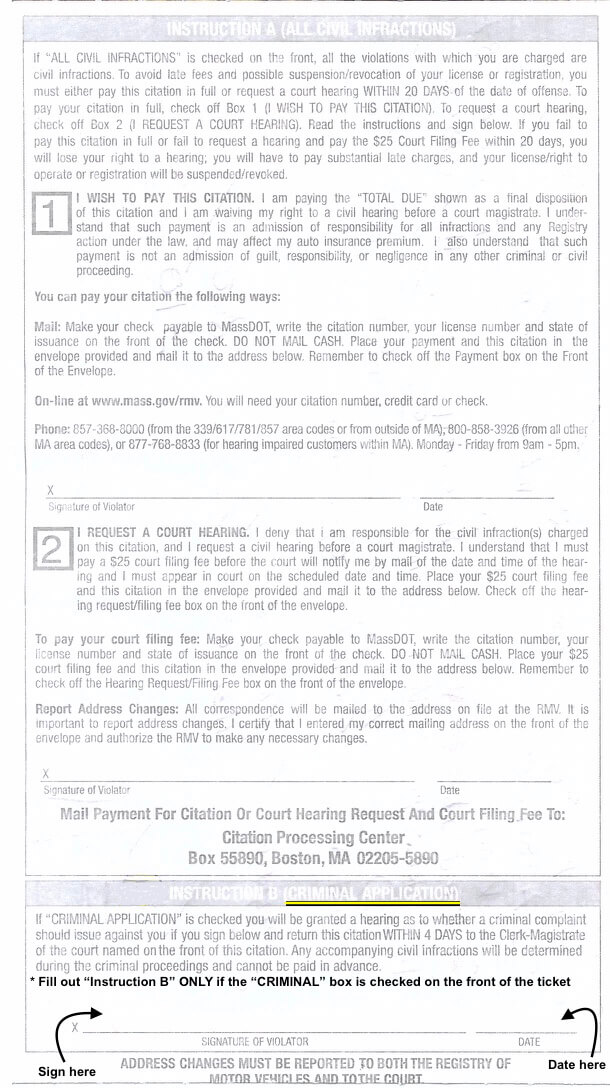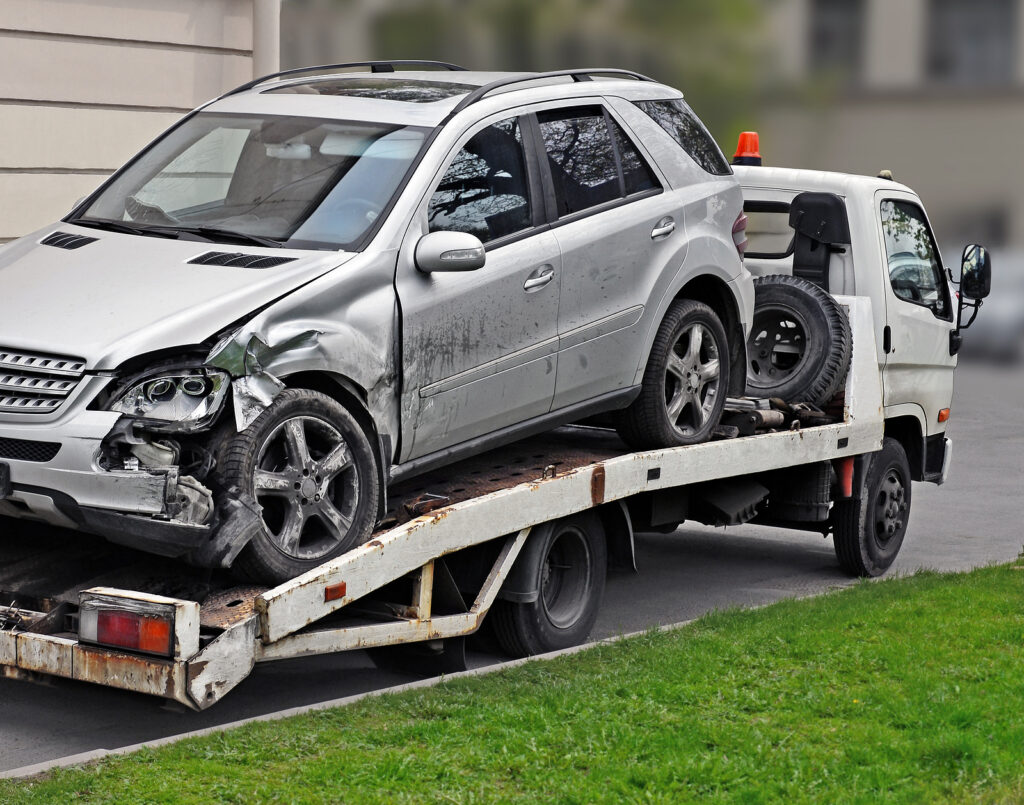The Process to Appeal Civil and Criminal Traffic Offenses
Once you have made the decision to appeal a civil or criminal traffic offense, timing is critical. For a civil motor vehicle citation, you only have twenty (20) days to submit the appeal. For a criminal traffic ticket, you only have four (4) days!
The attorneys at Contant Law are available to assist you through the process and are highly experienced in the courts representing our clients.
Step 1: Requesting a Court Hearing with the Clerk Magistrate
A. Process to Appeal a Civil Traffic Ticket / Citation:
Once you have made the decision to appeal, it is important you do so as soon as possible. Under the law, you will only have twenty (20) days to submit the appeal for a civil motor vehicle citation. Instructions for doing so appear on the back side of the ticket. See the image of this below.
You must check box #2 which says, “Request A Court Hearing” and then sign and date below where indicated. You must then mail the ticket and a fee of $25 to the Citation Processing Center at the address indicated on the ticket. You may have also received an envelope from the police officer with the address where the ticket and fee must be mailed. When mailing the request for a hearing, we recommend you do the following:
- Photocopy the ticket (front and back), check for the fee, and the addressed and stamped envelope
- Go to the post office to mail and obtain a receipt for your records.
These practices are helpful if the request for a hearing is lost in the mail or during processing. It will also help if we need to prove that you did request a hearing.
B. Process to Appeal a Criminal Traffic Ticket / Citation:
Once you have made the decision to appeal, it is important you do so as soon as possible. Under the law, you will only have four (4) days to submit the request for a clerk magistrate’s hearing for a criminal motor vehicle citation. Instructions for doing so appear on the back side of the ticket. We have an image of this below.
Look to the bottom of the ticket, where it says, “Instruction B (Criminal Application).” You will need to sign and date where indicated. The signed citation must then be mailed or brought to the District Court that has jurisdiction over the place where the offense occurred. The officer should have indicated which court this would be on the front of the ticket. However, if he or she did not, this is easy to find out with a simple internet search. When requesting a hearing before a clerk magistrate for a criminal violation, you should:
- Photocopy the ticket (front and back), and the addressed and stamped envelope (if mailing)
- Hand deliver the signed citation to the Court and get a receipt from the person at the Court to whom you give it.
Because the time period to request such a hearing is so short (four (4) days), we recommend you follow best practices and hand deliver it to the court. This ensures your request for a hearing is received in a timely manner and that there are no issues in getting the hearing.
Step 2: Planning Your Defense in Advance of the Hearing
With either civil or criminal violations described above, having a hearing before a clerk magistrate can be essential to having a successful result. This is your opportunity to be heard early and hopefully, keep the matter from going any further. You can bring witnesses and other evidence (photos, videos, weather reports, etc.) if you like. The court will NOT provide a lawyer for you. If you want an attorney to represent you at the clerk magistrate hearing, that is up to you. At Contant Law, we are committed to ensuring you have all the information to help you make an informed decision. As attorneys who represent our clients in such hearings all the time, we believe we offer great value to our clients by being with them for the hearing.
As with many court matters, there can be different ways to defend yourself. Some of the common methods may include:
- It wasn’t me
- It was me, but I had a very good reason
- I didn’t do what the police say I did
- The police can’t prove I did it
- The police didn’t follow the rules, so technically I shouldn’t be found in violation, even if I did it
- I did it, I’m sorry, and please give me a break because I am a good person
Regardless of which defense you plan, it is important to understand both the legal requirements and your audience.
Know Your Audience:
First, clerk magistrates are not judges. They have a very important role and a great deal of power in the courts, but their job is different than that of a judge. These days many clerk magistrates are lawyers. However, this is not a requirement. It is important to understand your audience. With some clerks, a common sense approach may win out over a technical legal defense. With others, it might be the reverse. Securing a good lawyer with experience in the courts will help you navigate this process.
It is not always about the law or who is right:
Many clerk magistrates are not lawyers, and those who are lawyers often make decisions based on common sense rather than strict legal technicalities. Some of our clients do not necessarily have a good legal defense to the facts presented. However, that does not mean that we should just give up. Sometimes our defense lies in the client’s character. At Contant Law, we commonly explore many areas about our client to present to the clerk magistrate including but not limited to the following:
- Have a family
- Have a good job
- Have a clean criminal record
- Have a good driving record
- Need their license and car for their job
- Need their license and car to care for someone else
- Have current or past military service
- Have strong community ties
The above is just a sample of the things we at Contant Law may explore in defending you for a criminal traffic offense to prepare for a clerk magistrate hearing. Can we present a picture and tell of story of a good person who simply made a mistake? Many times, it is more about you as a person than it is about the facts of the case. Having a good lawyer with you to help craft and tell this story can often make a difference in obtaining a successful result.
Step 3: The Hearing Before a Clerk Magistrate
Legal Requirements:
The legal requirements and burdens of proof are different when it comes to criminal traffic violations and civil traffic violations. Each is discussed below:
Civil Traffic Ticket:
With a civil traffic citation, the clerk magistrate does not make a finding of guilt or innocence. The clerk will find that you are either “responsible” or “not responsible.” The clerk applies the civil standard of proof, called a “preponderance of the evidence” in making this decision. This standard means that the side whose proof tips the scales even a little bit wins. This can also be explained in terms of percentages, as the person whose evidence supports their position 51% would win. If the clerk magistrate believes you and the evidence you present just a bit more than the police and the evidence they present, you would win.
At this type of hearing, the clerk magistrate is what we call the finder of fact. The clerk has a lot of discretion in who they choose to believe and how to decide a particular situation.
In a civil traffic ticket appeal, if the clerk magistrate finds you are not responsible, there is no fine, and your driving record is not affected. If the clerk magistrate finds you responsible, then you pay the fine and the civil infraction appears on your driving record. However, even with a responsible finding, the clerk does have the ability to reduce the amount you would have to pay. Some clerks will reduce the fine to the minimum fine, which is $50.
A few things to keep in mind:
- The police officer who pulled you over does not need to appear at the clerk magistrate’s hearing. There must be an officer from that police department, but it does not have to be that specific officer. Most police departments have a court liaison officer, known as a police prosecutor, who presents the ticket and other evidence.
- The police are required to have and present the ticket. This is the minimum evidence they need to prove their case against you.
- Whoever loses the hearing (you or the police) does have the right to appeal the clerk magistrate’s decision to a judge. If you chose to appeal the finding to a judge, you would need to inform the clerk magistrate at the end of the hearing and pay a $50 fee for such an appeal.
- If you appeal to a judge, the police officer who pulled you over would have to appear at that hearing.
Criminal Traffic Ticket:
At a hearing for a criminal offense, the clerk magistrate must decide whether or not the criminal charge will be issued against you. The legal standard that they must apply to the facts presented is called “probable cause.” This is a very low standard of proof and one which may be easily met by the police. Stated differently, did the police show enough evidence that it is more probable than not that you committed the offense? I often explain this in terms of mathematical percentages. Did the police have enough evidence for the clerk magistrate to think you may have done the crime (25-30%)?
The clerk magistrate has a lot of discretion on who to believe and whether to issue the charges. The clerk can:
- Find that there is probable cause and issue the charges. You would then have to go before a judge and start the criminal process.
- Find the evidence is not sufficient to establish probable cause and not issue the charges. You would then be free to go with no further repercussions.
- The hybrid option: The clerk finds probable cause to issue the charges but chooses not to do so. This usually involves the clerk defining a remedy for the charges. It is kind of like probation. An example for a criminal driving offense could be that you are required to take a driver’s safety class in addition to staying out of trouble and possibly paying a fine. This is just one possible example. The remedy can be creative and can include many possible alternatives.
For a criminal offense hearing, the police officer who pulled you over does not have to appear at the clerk magistrate’s hearing. There must be an officer from that police department, but it does not have to be that specific officer. Most police departments have a court liaison officer, known as a police prosecutor who presents the ticket and other evidence. At a criminal hearing, it is common for a court liaison officer to read from the other officer’s police report.
Time is very important in the appeals process. If you want a proven attorney in your court, let’s talk. Call (617) 221-8221 or reach out to our office online to discuss your situation in detail.








